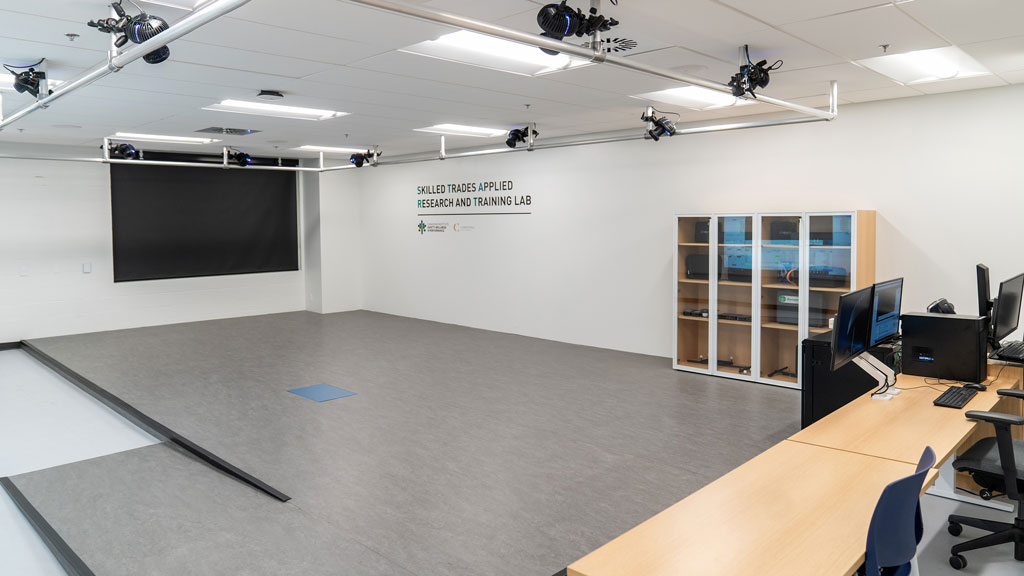Two new research labs at Conestoga College are equipped to help researchers identify solutions to reduce workplace injuries and create safer, more sustainable, productive and inclusive workplaces.
The Canadian Institute for Safety, Wellness and Performance (CISWP) at Conestoga College’s Institute of Technology and Advanced Learning in Cambridge, Ont. recently announced the launch of the labs. Conestoga is the only college in Canada with a research institute dedicated to work and health research.
“Over the past five years we have focused on building infrastructure capacity as well as having the expertise necessary to address these issues and emerging challenges that organizations face to create safer and more inclusive workplaces,” said Amin Yazdani, executive director of the CISWP. “These labs are part of our effort to build that capacity.”
Each lab is named for its research mandate. START stands for Skilled Trades Applied Research and Training and STRIDE is for Skilled Trades Research in Inclusivity, Diversity and Equity.
Labs an ‘unprecedented opportunity’
The labs are equipped with cutting-edge technology and will give the institute’s researchers the ability to collect a multitude of precise measurements of workers’ performance with a focus on injury prevention.
“We tend to discuss the research aspect but there is a training aspect as well,” pointed out Marcus Yung, director of development and operations with the CISWP.
“We’re quite fortunate to be here at Reuter (Drive) Campus with hundreds and thousands of apprentices who matriculate through the campus. Having the potential next generation workers, having that access, allows us to bring them into the lab to provide some training.”
So what does that look like?
“It could be taking our sensor systems and providing biofeedback so that we understand best practices and best techniques to a particular task, let’s say a drilling task,” Yung explained. “What does that movement look like currently and what was a better strategy to reduce the risk of injury?”
Yazdani said the labs could transform work and health research in Canada.
“We have this unprecedented opportunity to influence change early on and more broadly while these apprentices and these skilled trades trainees are actually receiving training, improving their skills or learning new skills,” he said.
Tackling the labour shortage with new strategies
One of the goals is to identify practical solutions to address Canada’s labour shortage.
The START lab’s equipment can measure multiple dimensions of human performance related to injury risk and will allow CISWP researchers to conduct studies to understand the cause of injuries and develop and evaluate targeted solutions, indicates a release.
It’s equipped with specialized biomechanical, neurocognitive and physiological instruments and technologies.
Yung said the lab houses specialized equipment and supports CISWPs field-to-lab-to-field research approach. The portable measurement equipment and wearable sensors are taken into the field to study workers on the job. Field measurements give a realistic view of the worker’s tasks and the lab allows a more controlled setting.
“It allows us to intermingle the various benefits and aspects of field research, which is using real workers, assessing what they do while they are performing their actual tasks in their work environment and combining that with the control of an in-house lab situation,” said Yung. “By combining these components we can ensure that any sort of research function that we conduct is not only valid but also can be practical and usable for end users.”
The STRIDE lab consists of anthropometric equipment, the only one of its kind in Canada, which will be used to develop comprehensive databases to support the inclusive design of equipment, tools and personal protective equipment.
“Our approach is what can we do to improve job accessibility, which might include improving design of equipment, personal protective equipment, design of tools and materials so that anyone, no matter where they come from, can enter these careers and also prosper within these careers,” said Yung.
The lab features a 4D body scanner system and optical 3D foot scanner systems that generate precise and reproducible calculations of body dimensions.
“That is a next generation technology that we are very fortunate to have access to and be able to provide that high quality data for organizations to use,” said Yazdani. “One aspect that is really important is that we currently do not have any of that data in Canada. We’re hoping that with this technology we will be able to create sector-specific databases that will be used by manufacturers of tools and equipment.”
The labs are well situated in an ecosystem with researchers, apprentices and subject matter experts, said Yung.
“By having them involved we can make sure that anything that we develop, which could be controls, interventions, new products, new equipment that it’s actually suited for the end user, it actually works, it’s practical, feasible and it’s usable,” he said.
CISWP will be hosting a grand opening of the labs on Oct. 15 at their Skilled Trades Safety Fair 2024 which will feature keynote speakers, lab tours and exhibitors.
To view a video of the facilities click here.
Follow the author on X/Twitter @DCN_Angela



Recent Comments
comments for this post are closed